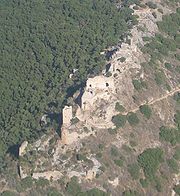
Spur castle
Encyclopedia
A spur castle is a type of medieval fortification that uses its location as a defensive feature. The name refers to the location on a spur
projecting from a hill. Ideally, a spur castle would be defended on three sides by steep hillsides, with the only vulnerable side the one where the spur joins the next hill.
 Depending on the local topography, a spur castle may depend mostly on its inaccessible location, or combine it with defensive features such as walls and towers. A typical feature is a moat
Depending on the local topography, a spur castle may depend mostly on its inaccessible location, or combine it with defensive features such as walls and towers. A typical feature is a moat
cutting off the spur from the rest of the hill. When the spur is long and narrow, the term ridge castle
is sometimes used as well.
A long spur castle is sometimes, but not always, subdivided into a lower ward
and a more strongly defended upper ward (or even a succession of more wards).
Spur (mountain)
A spur is a subsidiary summit of a hill or mountain. By definition, spurs have low topographic prominence, as they are lower than their parent summit and are closely connected to them on the same ridgeline...
projecting from a hill. Ideally, a spur castle would be defended on three sides by steep hillsides, with the only vulnerable side the one where the spur joins the next hill.

Moat
A moat is a deep, broad ditch, either dry or filled with water, that surrounds a castle, other building or town, historically to provide it with a preliminary line of defence. In some places moats evolved into more extensive water defences, including natural or artificial lakes, dams and sluices...
cutting off the spur from the rest of the hill. When the spur is long and narrow, the term ridge castle
Ridge castle
A ridge castle is a term derived from the German word Kammburg for a medieval fortification built on a ridge or the crest of mountain or hill chain.Ridge castles were not a common type of fortification...
is sometimes used as well.
A long spur castle is sometimes, but not always, subdivided into a lower ward
Ward (fortification)
In fortifications, a bailey or ward refers to a courtyard enclosed by a curtain wall. In particular, an early type of European castle was known as a Motte-and-bailey. Castles can have more than one ward. Their layout depends both on the local topography and the level of fortification technology...
and a more strongly defended upper ward (or even a succession of more wards).
Examples of spur castles
- The crusader castle Krak des ChevaliersKrak des ChevaliersKrak des Chevaliers , also Crac des Chevaliers, is a Crusader castle in Syria and one of the most important preserved medieval castles in the world. The site was first inhabited in the 11th century by a settlement of Kurds; as a result it was known as Hisn al Akrad, meaning the "Castle of the...
lies on a the spur of a hill only accessible from the South. At the same time, it has strong concentric castleConcentric castleA concentric castle is a castle with two or more concentric curtain walls, such that the outer wall is lower than the inner and can be defended from it. The word concentric does not imply that these castles were circular; in fact if taken too literally the term "concentric" is quite misleading...
defences on all sides. (Kennedy 2000)
- In the castle at Saone, the defences are concentrated on the vulnerable side of the spur, most notably a deep ditch. The lower bailey at Saone has weaker walls and towers. (Nicole 2008)
- The Teutonic KnightsTeutonic KnightsThe Order of Brothers of the German House of Saint Mary in Jerusalem , commonly the Teutonic Order , is a German medieval military order, in modern times a purely religious Catholic order...
' Montfort CastleMontfort CastleMontfort is a ruined crusader castle in the Upper Galilee region in northern Israel, about 22 miles northeast of the city of Haifa and 10 miles south of the border with Lebanon....
is a narrow ridge castle that relies for its defence on the steep rocky hillsides, lacking many of the innovations of the larger crusader castles and resembling smaller German baronial castles. (Nicolle 2008)
- The Alcázar of SegoviaAlcázar of SegoviaThe Alcázar of Segovia is a stone fortification, located in the old city of Segovia, Spain. Rising out on a rocky crag above the confluence of the rivers Eresma and Clamores near the Guadarrama mountains, it is one of the most distinctive castle-palaces in Spain by virtue of its shape - like the...
in SpainSpainSpain , officially the Kingdom of Spain languages]] under the European Charter for Regional or Minority Languages. In each of these, Spain's official name is as follows:;;;;;;), is a country and member state of the European Union located in southwestern Europe on the Iberian Peninsula...
which is located on a narrow spur with deep drops all around except from the east where it is approached on level ground.

